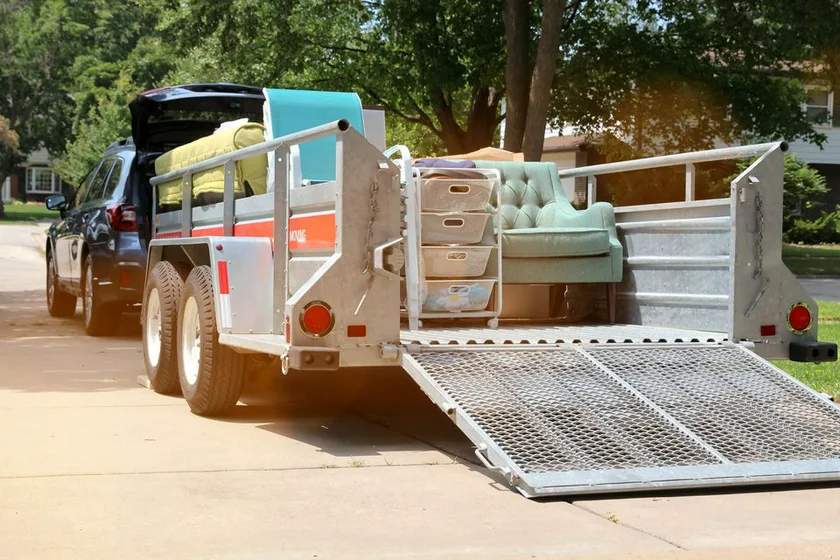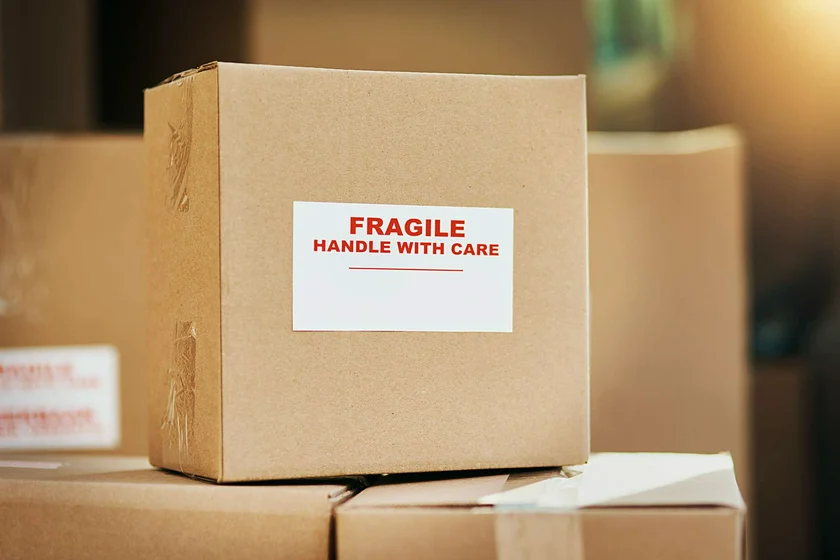Whether you're planning a move to the Czech Republic from overseas or need to move your stuff across Europe, unraveling the ins and outs of international shipping can be tricky, not to mention costly if you don't do it right.
Logistics company Eurosender has successfully helped people ship everything from entire households to beloved musical instruments by land and sea, from door to door. Here they outline how to ship anything to or from the Czech Republic, while offering up some important tips on how to make your move as smooth as possible.
Decide which items will come with you

First things first: Nail down dimensions. If you're moving take stock of all of your personal belongings and household items to determine what is essential and what is replaceable then get out your tape measure!
As you're deciding what stays and goes, factor in the cost of buying certain items in the Czech Republic, where electronics and clothes tend to be on the pricier side, versus the cost of shipping them.
Fully-furnished rentals are widely available in Prague and multiple IKEA locations are just a metro ride away so it may be advantageous to leave it all behind.
Shipping, freight, or ground transport: choose the right service for you

Once you know what you want to ship abroad and how much space you need -- maybe you can’t part with your beloved bedroom set, or on the contrary, want to send just a few boxes of clothes or books -- it'll be easier to chose the right shipping service.
The most important things is to ensure that your package does not exceed the weight and dimension restrictions for your type of shipment. If you exceed the weight limit, there's a chance your package may not reach its final destination.
Standard shipping
If you're traveling light and just want to send a few boxes or suitcases, standard shipping (roughly 10 boxes max) is the way to go. You should get your things in 5-7 working days or if you opt for express shipping 24 hours (in Europe) or 48 hours (global).
Standard shipping dimensions are as follows:
- Weight up to 30 kg
- Maximum length of 175 cm
- Length (in cm) + 2x width (in cm) + 2x height (in cm) < 300 cm (length plus two times width plus two times height should be less than 300 cm or 3 m altogether)
Freight shipping
If you’ll be moving bulkier household items such as furniture or oversized oddly shaped items, you’ll need to send your belongings via freight transport on palettes.
When choosing this option you'll need to be able to provide the exact dimensions length, width, and height (in cm) and weight (in kg) to your carrier.
Larger items can be sent individually but if an items weigh more than 50 kilograms, they'll need to be placed on a non-skid, sturdy pallet for easier handling (see packing tips below).
Ground transport
Anyone who plans to move the majority of their home or belongings from within Europe to the Czech Republic, can do so via van delivery service in Europe, which can be used for moving any type of large shipment from a motorocycle to a few boxes.
If you need to transport a lot of boxes or larger items, this can be the most cost-effective option, because you don't pay for each package individually (and you do not necessarily need to follow the packing guidelines, as you would with individual shipments sent through standard or any other type of service).
Delivery time for dedicated vehicles throughout Europe is an estimated 24-48 hours. Van sizes are:
- Box van: 465 x 165 x 180 cm or 13 cubic meters and 800 kg capacity
- Curtain-side van: 410 x 210x 230cm or 19 cubic meters and 1100 kg capacity
Pack it up like a pro

Proper packing helps to better ensure that your shipment arrives safe and sound without any issues along the way:
Standard shipment (overseas move)
- Make sure to protect the wheels and handles on the suitcase, as these are the most sensitive parts. Write your contact details on the box or suitcase as well, to be on the safe side.
- In the Czech Republic, wrapping suitcases is mandatory 90 percent of the time. When you wrap your suitcase, couriers will stick a label to the suitcase onto the suitcase. With fabric suitcases, it can easily fall off.
- All items other need to be packed into a cardboard box that is free of holes, tears or dents; something moisture-resistant with double cardboard walls is the best choice.
- When packing, fill the box with internal cushioning; make sure the items inside the box do not directly touch the box. When sealing the box, wrap it with duct tape and ensure it is sealed on all sides.
- You should evenly apply at least three strips of packing tape, at least 5 cm wide, across all flaps and seams, top and bottom.
Freight or container shipment (overseas move)
If your items are too bulky for standard shipping, you'll need to send them via freight. Largers items can be sent individually in a box (apply the same rules for packing) but items weighing more than 50 kilograms should be placed on a non-skid, sturdy pallet for easier handling.
Your pallet may be handled multiple times. To prevent damage, make sure to:
- Use cushioning material and rigid carton material.
- Secure and block with braces larger items. Items with uncommon shapes that cannot be boxed or items that are prone to slide.
- Use load-protector trays, bands and stretch wrap film to protect the shipment. An additional ‘tamper-tape’ can be wrapped around the load to ensure nobody interferes with the parcel.
- If you notice a certain box is heavy, be sure to put on a warning label so the person lifting it is aware.
Dedicated vehicle transport across Europe
When using a van, make sure to prepare all your packages on the ground floor when the van arrives. Extra assistance may cost an added fee though the driver typically comes with the price.
Not all your items need to be packed for van services. However, fragile items should be packed. Make sure to pack your items following best packing practices laid out above, using sturdy boxes that are well labeled, and padding your shipments.
Insuring your items

No matter what you plan to ship, getting insurance is a must for financial protection in the unlikely event of loss or damage to your shipment. Many logistics companies will insure all items and additional insurance can be bought via their services.
If you end up filing a claim, it’s important to note that the declared value of the package, or the shipping insurance value, is the maximum coverage. You will only be reimbursed when the provider or carrier conducts an investigation and sets the value of the losses.
Which kind of insurance will depend on which shipping service you use:
Standard shipping: if you plan to ship your items, you will need to buy insurance for each package. You can normally purchase the insurance through your logistics provider or the shipment company.
Freight shipping: Freight shipments are insured according to the provisions of the Convention on the Contract for the International Carriage of Goods by Road (CMR Convention). Your insurance will apply to the entire package, and you can purchase it through a third party company, a logistics provider or the carrier.
Navigating pick up, tracking, and delivery

Once everything is packed up a ready to go you have a few options when it comes to pick up (removal in moving company parlance) and delivery to your destination.
Port to port: with this option, you’ll bring your items to the port and you’ll pick them up from the port once they arrive.
Drop and fill: The shipping container will be dropped off at your house and you will fill it up. The company will then come and pick it up. When your stuff arrives, the reverse will happen.
Door to door: Many moving companies offer door-to-door service options so you don’t have to arrange for another company to bring your shipment to your door. The benefit being that you don’t have to arrange for another company to bring your shipment to your door and fees are in most cases instant and final.
Most carriers offer tracking throughout the entire journey and will give you an estimated delivery time while sending notifications via e-mail or text when your parcel is scanned at a new depot or location.
The lowdown on customs
When you ship your items, you will need to provide an itemized customs declaration for your shipment. You should fill out carefully and note that if you are importing items on the restricted items list, or if there is an error in the paperwork it could pose problems.
If your package does get stuck in customs, you may be charged additional fees for customs handling, an advanced duty on paying VAT, or a screening or security fee.
You will not be charged customs fees while transporting items from one EU country to another though there may be exceptions to this rule (eg if the goods are subject to state monopoly, you could pay extra).
But you will pay customs on items coming from non-EU countries into the Czech Republic. The price will vary depending on the items; if you don't speak Czech it's worth hiring a company like Eurosender to help you sort out the process hassle-free.
What to do when you get your shipment
Once you get your shipment and you are presented with a bill of landing, inspect your shipment thoroughly before signing the document.
If your shipment doesn't make it intact your insurance coverage will come into play. Record any missing items and take specific notes; if something is damaged, take photos and don’t throw them away; keep everything as evidence until the issue has been resolved.
You will need to file a claim within 30 days of receiving the shipment; and pay the carrier in the meantime as the process is resolved. Your insurance company will process the claim.
If your freight was lost or damaged during road transport, a slightly different process will apply. All European countries have the same legislation: if the carrier is responsible for lost or damaged freight during transport, the carrier must cover up to approximately 11 euro (8.33 SDR) per kilogram of damaged or lost goods.
Logistics companies will also insure all items and additional insurance can be bought via their services.
Get a price calculation

Shipping costs will vary depending on a variety of factors, from package measurements, shipment type, weight, location, and more. Once you've determined these variables, then a carrier can caluclate a price on your shipment.
Do you need to ship something to or from the Czech Republic from overseas or across Europe? Eurosender offers customized services and individual logistics solutions help you find the most cost-effective way to move any parcel or shipment. To calculate the cost of your move visit their convenient online price calculator.












 Reading time: 8 minutes
Reading time: 8 minutes 


















